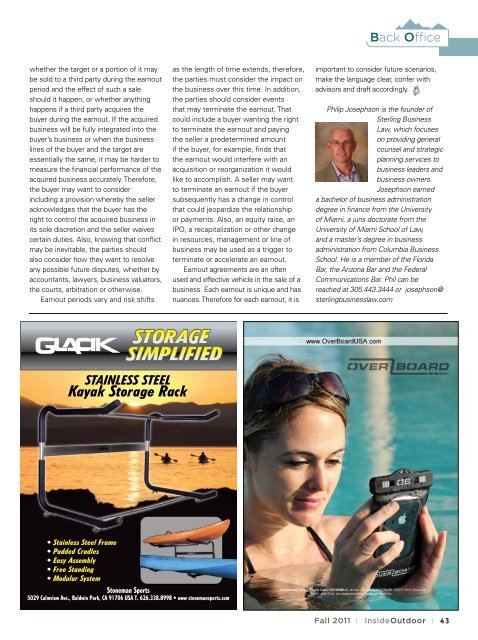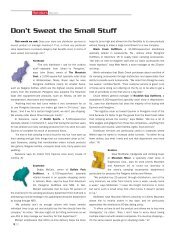Fall - InsideOutdoor Magazine
Fall - InsideOutdoor Magazine
Fall - InsideOutdoor Magazine
You also want an ePaper? Increase the reach of your titles
YUMPU automatically turns print PDFs into web optimized ePapers that Google loves.
Back Office<br />
whether the target or a portion of it may<br />
be sold to a third party during the earnout<br />
period and the effect of such a sale<br />
should it happen, or whether anything<br />
happens if a third party acquires the<br />
buyer during the earnout. If the acquired<br />
business will be fully integrated into the<br />
buyer’s business or when the business<br />
lines of the buyer and the target are<br />
essentially the same, it may be harder to<br />
measure the financial performance of the<br />
acquired business accurately. Therefore,<br />
the buyer may want to consider<br />
including a provision whereby the seller<br />
acknowledges that the buyer has the<br />
right to control the acquired business in<br />
its sole discretion and the seller waives<br />
certain duties. Also, knowing that conflict<br />
may be inevitable, the parties should<br />
also consider how they want to resolve<br />
any possible future disputes, whether by<br />
accountants, lawyers, business valuators,<br />
the courts, arbitration or otherwise.<br />
Earnout periods vary and risk shifts<br />
as the length of time extends, therefore,<br />
the parties must consider the impact on<br />
the business over this time. In addition,<br />
the parties should consider events<br />
that may terminate the earnout. That<br />
could include a buyer wanting the right<br />
to terminate the earnout and paying<br />
the seller a predetermined amount<br />
if the buyer, for example, finds that<br />
the earnout would interfere with an<br />
acquisition or reorganization it would<br />
like to accomplish. A seller may want<br />
to terminate an earnout if the buyer<br />
subsequently has a change in control<br />
that could jeopardize the relationship<br />
or payments. Also, an equity raise, an<br />
IPO, a recapitalization or other change<br />
in resources, management or line of<br />
business may be used as a trigger to<br />
terminate or accelerate an earnout.<br />
Earnout agreements are an often<br />
used and effective vehicle in the sale of a<br />
business. Each earnout is unique and has<br />
nuances. Therefore for each earnout, it is<br />
important to consider future scenarios,<br />
make the language clear, confer with<br />
advisors and draft accordingly.<br />
Philip Josephson is the founder of<br />
Sterling Business<br />
Law, which focuses<br />
on providing general<br />
counsel and strategic<br />
planning services to<br />
business leaders and<br />
business owners.<br />
Josephson earned<br />
a bachelor of business administration<br />
degree in finance from the University<br />
of Miami, a juris doctorate from the<br />
University of Miami School of Law,<br />
and a master’s degree in business<br />
administration from Columbia Business<br />
School. He is a member of the Florida<br />
Bar, the Arizona Bar and the Federal<br />
Communications Bar. Phil can be<br />
reached at 305.443.3444 or josephson@<br />
sterlingbusinesslaw.com<br />
<strong>Fall</strong> 2011 | <strong>InsideOutdoor</strong> | 43

















